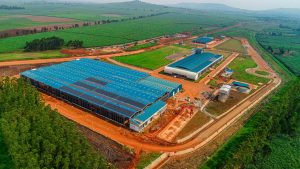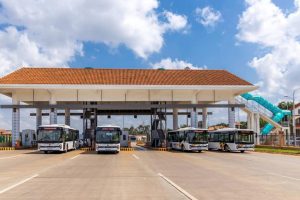
Out to Lunch: Giga factories could provide solutions to Africa’s job challenges
By Denis Jjuuko There used to be a TV series on the National Geographic channel that showed some of the biggest or busiest things in the world. From the busiest hotel in the world, train station to the airport. Imagine a hotel with 7,000 rooms, fully booked and all the guests eating breakfast at almost the same time or within a few hours. And then meals have to be prepared for a similar number as well as walk in clients. Think of an airport that handles more than 250,000 passengers a day. The same TV program also had a segment on mega factories sitting on hundreds of acres of land with thousands of employees producing some of the famous brands we know today. These series were some of the most fascinating things one can watch. A single factory as big as some of the suburbs of Kampala. If you are a regular reader of this column, you may have noticed my fascination with manufacturing. I think most countries develop by manufacturing stuff even though some have done so through financial services and being trading outposts. But the majority, it is manufacturing that creates the jobs and propels economic transformation. The United States, the world’s biggest economy, is desperate to have the factories back from China and elsewhere. Germany, Europe’s biggest economy, is known for manufacturing. Japan is also known for the same. Without mega factories in China, the majority of Chinese would be unemployed. Manufacturing creates sustainable decent jobs where the majority of people can work. It doesn’t require sophistication for workers to get things done because what the majority of factory workers do is repetitive. Within a few days on the job, a worker can easily be trained to press a button or fix something before the product goes to the next person on the line even for the most sophisticated products. Africa plays a decimal role in manufacturing relying on other countries to do so. A report by McKinsey says that Africa will need to create 18 million jobs a year to absorb the growing labour force until about 2035. Payment apps and all sorts of apps built around the Airbnb and Uber models that are attracting lots of funding from angel investors won’t be the only solution for Africa’s development. In fact, the majority of those apps are collapsing because they were surviving on capital being raised from Silicon Valley without enough customer base to sustain them. They should have known that unemployed people have no money to transact through the payment apps and are too broke to order for food on delivery apps. One of the things Africa can do is to build factories. They don’t have to be mega though like those in the TV series. We could build giga ones instead and get the continent ready for the battery market in preparation for a transition from fossils to electrification of mobility. Oil, as a scarce resource, made the countries where it was discovered wealthy. Countries couldn’t just manufacture oil. They had to drill it in the wells where it was discovered in commercially viable quantities. The world relied on them and they could sometimes refuse to pump or pumped more than required. As electric vehicles become the norm, those who will have invested in giga factories will become as important as the Arabs have been with their oil. Unlike oil which couldn’t be found anywhere in sufficient commercial quantities, anyone can build batteries and electrification components if they focused on them. There are more electric boda bodas in Kampala than ever and people have started importing electric and hybrid vehicles given that this financial year there is no import duty charged on such vehicles. The countries that are developing this capacity today won’t pass on the knowledge to Africans. The continent will continue to organize conferences sponsored by the west to talk and talk about the imbalance between the north and south and issue communiques after communiques like it has been the case for more than 60 years now. Nobody will transfer knowledge to the continent because some technocrats attended a conference and talked about it. Many of the raw materials required to make the batteries are here. What is required is to build our intellectual property to play a part in this industry. Building the giga factories on the continent will not only create sustainable decent jobs but also enable vertical integration of automotive and mobility businesses and wean Africa off its reliance on global supply chains that can easily be disrupted by geopolitical maneuvers or pandemics like we saw in 2020. The writer is a communication and visibility consultant. djjuuko@gmail.com


